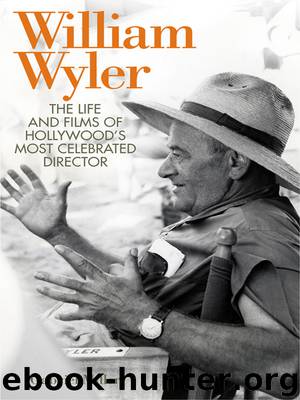William Wyler by Gabriel Miller

Author:Gabriel Miller
Language: eng
Format: epub
Publisher: The University Press of Kentucky
11
The Way Home
The Best Years of Our Lives (1946)
When Wyler returned from Europe after the war, his feelings about his life and profession had changed. He told Hermine Isaacs, “No one could go through that experience and come out the same. You couldn't live among war-torn civilians, among airmen flying missions and ground crews waiting for their return without learning about people and how they function as individuals.”1 Twenty years later, he elaborated, “The war had been an escape into reality. In the war it didn't matter how much money you earned. The only thing that mattered were human relationships…. Only relationships with people who might be dead tomorrow were important.”2
He still owed Goldwyn one more film. One planned feature was a life story of Dwight D. Eisenhower, a project Goldwyn had been negotiating for months. Robert Sherwood was working on a screenplay, and there were tentative plans that he and Wyler would go to Germany and spend some time with the general. Wyler, however, was not enthusiastic about the project. He also turned down The Bishop's Wife, based on Robert Nathan's 1928 best seller, which Goldwyn wanted for David Niven. What sparked his interest, instead, was a project that Goldwyn had shelved: Glory for Me by MacKinlay Kantor.
The producer had originally commissioned the project in 1944, when, on his wife's recommendation, he read a Time magazine article entitled “The Way Home,” about marines who were having difficulty readjusting to life after the war.3 Kantor, who would go on to win a Pulitzer Prize for his Civil War novel Andersonville (1955), had flown missions with the Eighth Air Force and the Royal Air Force as a correspondent. He signed an agreement with Goldwyn in September 1944 to come to California to discuss a story idea suitable for a film tentatively called “Home Again”—a variation on the Time article title. Kantor later signed a contract to write a fictional adaptation of approximately 100 pages. He was to be paid $12,500, of which he received $5,000 in advance. The story was to be delivered in ten weeks.
Kantor then spent several months touring hospitals and studying the problems of discharged patients before, inexplicably, turning in a novel in verse that ran close to 300 pages. Goldwyn found the blank verse incomprehensible and wanted to shelve the project, but he agreed to let Kantor work on a treatment. When Wyler expressed interest in the project, Goldwyn tried to talk him out of it. “He thought it was nothing—ten thousand wasted,” Wyler recalled.4 But Wyler liked Kantor's story precisely because it was about ordinary soldiers, unlike the Eisenhower project, which focused on leadership at the top. More important, it resonated with Wyler on a personal level: “I knew these people, shared a good many of their experiences.”5
Wyler brought Kantor's material to Robert Sherwood, who was working on the Eisenhower project and had three Pulitzer Prizes for drama to his credit (Abe Lincoln in Illinois, Idiot's Delight, There Shall Be No Night), as well as a number of impressive screenwriting credits (Rebecca, The Scarlet Pimpernel, The Divorce of Lady X).
Download
This site does not store any files on its server. We only index and link to content provided by other sites. Please contact the content providers to delete copyright contents if any and email us, we'll remove relevant links or contents immediately.
| Direction & Production | Reference |
The Kite Runner by Khaled Hosseini(5160)
Gerald's Game by Stephen King(4636)
Dialogue by Robert McKee(4385)
The Perils of Being Moderately Famous by Soha Ali Khan(4204)
The 101 Dalmatians by Dodie Smith(3503)
Story: Substance, Structure, Style and the Principles of Screenwriting by Robert McKee(3452)
The Pixar Touch by David A. Price(3428)
Confessions of a Video Vixen by Karrine Steffans(3293)
How Music Works by David Byrne(3255)
Harry Potter 4 - Harry Potter and The Goblet of Fire by J.K.Rowling(3054)
Fantastic Beasts: The Crimes of Grindelwald by J. K. Rowling(3048)
Slugfest by Reed Tucker(2994)
The Mental Game of Writing: How to Overcome Obstacles, Stay Creative and Productive, and Free Your Mind for Success by James Scott Bell(2894)
4 - Harry Potter and the Goblet of Fire by J.K. Rowling(2694)
Screenplay: The Foundations of Screenwriting by Syd Field(2625)
The Complete H. P. Lovecraft Reader by H.P. Lovecraft(2548)
Scandals of Classic Hollywood: Sex, Deviance, and Drama from the Golden Age of American Cinema by Anne Helen Petersen(2512)
Wildflower by Drew Barrymore(2483)
Robin by Dave Itzkoff(2431)
